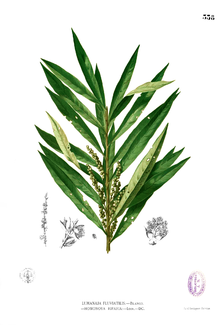Homonoia riparia, the willow-leaved water croton,[2] a mangrove species, belongs to the family Euphorbiaceae. The plant is widely distributed through South Asian and South East Asian countries such as Cambodia, China, Indonesia, Laos, Papua New Guinea, Philippines, Sri Lanka, Taiwan, Thailand and Vietnam. It is grown in wet soil near river banks and flooded plains.[4]
| Willow-leaved water croton | |
|---|---|

| |
| Homonoia riparia[1] | |
| Scientific classification | |
| Kingdom: | Plantae |
| Clade: | Tracheophytes |
| Clade: | Angiosperms |
| Clade: | Eudicots |
| Clade: | Rosids |
| Order: | Malpighiales |
| Family: | Euphorbiaceae |
| Genus: | Homonoia |
| Species: | H. riparia
|
| Binomial name | |
| Homonoia riparia | |
| Synonyms | |
| |
Description
edit- Bark - brownish
- Leaves - simple, and alternate
- Flowers - wind pollinated monoecious flowers and bracts sub-ovate
- Height - 1–3-metre-tall evergreen shrub
- Ecology - A rheophyte
- Uses - medicine
Common names
editThe names are according to Asian Plant.net and Indian Flowers
- Borneo - Bongai tidong, Parang-parang
- Burma - Kyauk(a)naga, Momaka, Nyin ye bin.
- Cambodia - Rey tuck.
- China - Shui liu, shui yeung mui.
- English - Willow-Leaved Water Croton.
- India
- Hindi - Sherni (शेरनी)
- Marathi - Raan kaner (रान कणेर)
- Tamil - Kattalari (காட்டலரி)
- Malayalam - Neervanchi, Puzhavanchi
- Telugu - Adavi ganneru (అడవి గన్నేరు)
- Kannada - Hole nage, Niru kanigalu (ಹೊಳೆ ನಗೆ)
- Sanskrit - Kshudrapashanabheda (क्षुद्रपाषाणभेद)
- Java - Kajoe soebah, Keding djati, Soebah/Sobah,
- Laos - Kek khay.
- Philippines - Agooi, Agoioi, Agukuk,
- Thailand - K(l)ai nam, Klai hin, Mai kerai, (Ta)kri nam.
- Sri Lanka - Omi (ඕමි), Werawala (වැරවල)
- Sumatra - Sangka, Sangkir
- Vietnam - Cây rù rì nước, Rì rì, Rù rì.
References
edit- ^ 1880 illustration from Francisco Manuel Blanco (O.S.A.) - Flora de Filipinas
- ^ a b Kumar, B. (2020). "Homonoia riparia". IUCN Red List of Threatened Species. 2020: e.T176888A175308493. doi:10.2305/IUCN.UK.2020-2.RLTS.T176888A175308493.en. Retrieved 12 November 2021.
- ^ "Homonoia riparia Lour. — the Plant List".
- ^ "Homonoia riparia - EUPHORBIACEAE".
Further reading
editExternal links
edit- Asianplant.net: Homonoia riparia
- Park, Seonju; Nhiem, Nguyen Xuan; Van Kiem, Phan; Ban, Ninh Khac; Kim, Nanyoung; Kim, Seung Hyun (2014). "A new flavonoid glycoside from the leaves of Homonoia riparia". Biochemical Systematics and Ecology. 57: 155–158. doi:10.1016/j.bse.2014.08.006.
